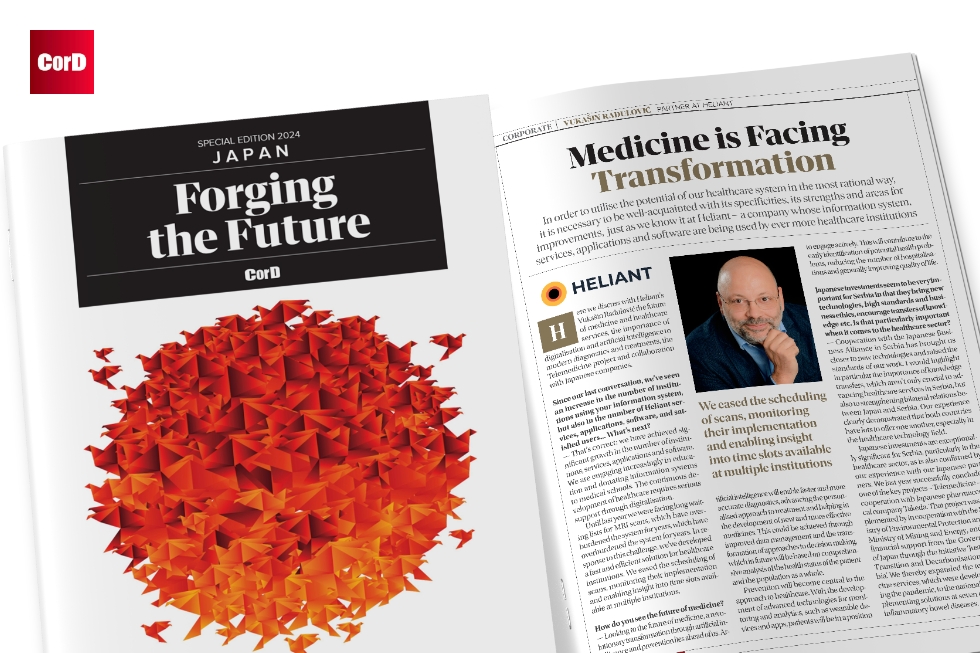CorD magazine published a special issue dedicated to Japan, entitled “Forging the Future”, which was addressed by the ambassador of Japan, the executive director of the Japan Business Alliance Serbia (JBAS), the general manager of Japan Tobacco International Serbia and others. As a member of JBAS, we were pleased to respond to the invitation to be part of this edition. Below, we publish an interview with Vukašin Radulović, a partner in the company Heliant, about the future of medicine and the role of digitization as one of the key supporting elements for successful prevention and personalized treatment.
Since our last conversation, we’ve seen an increase in the number of institutions using your information system, but also in the number of Heliant services, applications, software, and satisfied users… What’s next?
That’s correct; we have achieved significant growth in the number of institutions, services, applications and software. We are engaging increasingly in education and donating information systems to medical schools. The continuous development of healthcare requires serious support through digitization. Until last year we were facing long waiting lists for MRI scans, which have over-burdened the system for years. In response to this challenge, we’ve developed a fast and efficient solution for healthcare institutions. We eased the scheduling of scans, monitoring their implementation and enabling insight into time slots available at multiple institutions.
How do you see the future of medicine?
Looking to the future of medicine, a revolutionary transformation through artificial intelligence and prevention lies ahead of us. Artificial intelligence will enable faster and more accurate diagnostics, advancing the personalised approach to treatment and helping in the development of new and more effective medicines. This could be achieved through improved data management and the transformation of approaches to decision making, which in future will be based on comprehensive analysis of the health status of the patient and the population as a whole. Prevention will become central to the approach to healthcare. With the development of advanced technologies for monitoring and analytics, such as wearable devices and apps, patients will be in a position to engage actively. This will contribute to the early identification of potential health problems, reducing the number of hospitalisations and generally improving quality of life.
Japanese investments seem to be very important for Serbia in that they bring new technologies, high standards and business ethics, encourage transfers of knowledge etc. Is that particularly important when it comes to the healthcare sector?
Cooperation with the Japanese Business Alliance in Serbia has brought us closer to new technologies and raised the standards of our work. I would highlight in particular the importance of knowledge transfers, which aren’t only crucial to advancing healthcare services in Serbia, but also to strengthening bilateral relations between Japan and Serbia. Our experience clearly demonstrated that both countries have lots to offer one another, especially in the healthcare technology field. Japanese investments are exceptionally significant for Serbia, particularly in the healthcare sector, as is also confirmed by our experience with our Japanese partners. We last year successfully concluded one of the key projects – Telemedicine, in cooperation with Japanese pharmaceutical company Takeda. That project was implemented by in cooperation with the Ministry of Environmental Protection and the Ministry of Mining and Energy, and with financial support from the Government of Japan through United Nations Development Programme (UNDP)‘s initiative ‘Just Green Transition and Decarbonisation in Serbia’. We thereby expanded the telemedicine services, which were developed during the pandemic, to the national level, implementing solutions at seven centres for inflammatory bowel diseases.
Interview originally published on CorD Magazine portal:
